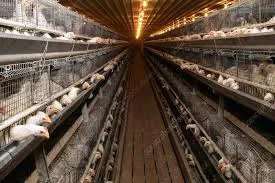pellet maker machine animal feed
Sep . 25, 2024 17:57 Back to list
pellet maker machine animal feed
The Importance of Pellet Maker Machines in Animal Feed Production
In the modern agricultural landscape, efficiency and quality are paramount. One of the most significant innovations to emerge in this field is the pellet maker machine, a vital equipment for producing animal feed. This technology not only streamlines the feeding process but also enhances the nutritional quality of the feed, contributing to better livestock health and productivity.
What is a Pellet Maker Machine?
A pellet maker machine, or pellet mill, is a device used to create pellets from powdered feed ingredients. It operates by compressing the material through a die, shaping it into small cylindrical pellets. This process is particularly beneficial for creating animal feeds as it transforms raw ingredients into a form that is easier for animals to digest, while also improving the feed's storage and transport characteristics.
Benefits of Using Pellet Feed
1. Nutritional Efficiency Pelleting ensures that nutrients are preserved, making it easier for animals to absorb essential vitamins and minerals. The high temperature during the pelleting process can also help in gelatinizing starch, which enhances digestibility. As a result, the nutritional value of the feed is maximized, leading to healthier animals and improved growth rates.
2. Reduced Feed Waste Loose feed can lead to significant waste due to spillage and sorting by animals. Pellets minimize this waste as animals are less likely to reject the feed. Furthermore, the compact nature of pellets allows for more efficient usage in feeding systems, ensuring that more of the feed is consumed.
3. Enhanced Livestock Health A well-structured pelleted diet can help reduce the occurrence of certain health issues in livestock, such as digestive disorders. The uniform size and density of pellets promote a balanced intake of nutrients, which is critical for maintaining overall animal health.
pellet maker machine animal feed

4. Convenience and Storage Pelletized feed is easier to handle and store. Pellets take up less space than loose feed and offer better resistance to spoilage. This is particularly important for large-scale operations where storage space is at a premium. Additionally, pellets are less prone to pest infestations compared to bulk grains.
5. Customizable Formulations Pellet maker machines allow producers to create customized feed formulations tailored to the specific dietary needs of different animal species. This flexibility ensures that livestock receive the optimal nutrients required for growth, reproduction, and overall health.
The Role of Technology in Pellet Production
Advancements in technology have significantly improved the efficiency and effectiveness of pellet maker machines. Modern machines are equipped with features such as variable speed control, temperature regulation, and automatic lubrication systems. These innovations ensure consistent pellet quality and reduce downtime during production.
Moreover, the integration of computer systems allows for precise monitoring and control of feed formulations. This technological evolution not only boosts production rates but also enhances the sustainability of animal farming practices. By optimizing feed efficiency, farmers can reduce their carbon footprint and make more responsible use of resources.
Conclusion
In conclusion, the pellet maker machine is a critical asset in the production of animal feed. Its ability to enhance nutritional quality, reduce waste, and promote better livestock health makes it an indispensable tool for farmers and feed manufacturers alike. As the demand for sustainable and efficient animal agriculture continues to grow, the adoption of pellet technology will play a significant role in shaping the future of the industry. By investing in advanced pellet mill technology, producers can ensure they meet the nutritional needs of their animals while also contributing to a more sustainable agricultural system. The benefits of pelletized feed are clear, making pellet maker machines a wise investment for any serious animal feed producer.
-
Hot Sale 24 & 18 Door Rabbit Cages - Premium Breeding Solutions
NewsJul.25,2025
-
Automatic Feeding Line System Pan Feeder Nipple Drinker - Anping County Yize Metal Products Co., Ltd.
NewsJul.21,2025
-
Automatic Feeding Line System Pan Feeder Nipple Drinker - Anping County Yize Metal Products Co., Ltd.
NewsJul.21,2025
-
Automatic Feeding Line System - Anping Yize | Precision & Nipple
NewsJul.21,2025
-
Automatic Feeding Line System - Anping Yize | Precision & Nipple
NewsJul.21,2025
-
Automatic Feeding Line System-Anping County Yize Metal Products Co., Ltd.|Efficient Feed Distribution&Customized Animal Farming Solutions
NewsJul.21,2025






